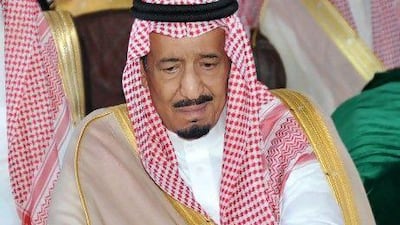WASHINGTON // King Abdullah of Saudi Arabia yesterday named his half-brother Salman bin Abdulaziz heir to the throne after the death on Saturday of Crown Prince Nayef.
Crown Prince Salman, 76, was also appointed deputy prime minister and remains minister of defence. Prince Ahmad bin Abdulaziz, 71, another of the king's half brothers, will assume Prince Nayef's interior ministry portfolio.
The appointment was widely expected. As one of the four remaining Sudairi Seven - the sons of Saudi Arabia's founder Abdulaziz Ibn Saud and Hussa Al Sudairi - Crown Prince Salman was considered the natural successor to Prince Nayef, his older brother.
Prince Sultan, Prince Nayef's predecessor who died last October, was also a full brother. Prince Ahmad is the youngest of the seven.
The appointment represents continuity but answers few questions about what will happen when succession begins to move to another generation of the royal family.
The five successions since the death of King Abdulaziz have all gone to his sons, who are now ageing. The bigger change will come "sooner rather than later", said Roby Barrett, a Gulf specialist with the Middle East Institute, a Washington-based think tank, when successions move to the grandsons.
"The really interesting issue is when they finally have to go to one of the grandsons," said Mr Barrett.
Washington will be watching that generation closely, wary of any instability in the kingdom.
Mr Barrett suggested that by that time, and much like with the two rapid successions to crown prince in the past year, it will already be obvious who is in pole position.
But the current appointments offer precious few hints. Where in the past the interior ministry and defence posts have offered clues as to who was where in the line of succession, the retention of the ministry of defence by Crown Prince Salman, and the appointment of Prince Ahmed at the interior ministry, suggests that the process of selection among the younger generation is still far from settled.
It also suggests that should Crown Prince Salman survive King Abdullah, who is 88, one of his most pressing tasks will be to manage the transition between the generations.
To this end, the Allegiance Council will be closely watched. King Abdullah created the family council in 2006 to decide on issues of succession and give voice to all branches of the large Al Saud family.
The Allegiance Council includes all the sons of Abdulaziz as well as those grandsons whose fathers have passed. Its role in the next years is likely to prove a crucial bellwether of where power within the Saudi royal family is heading, said Marina Ottaway of the Carnegie Endowment for International Peace.
"What we are going to see is a lot of jockeying for position among members of the next generation," she said.
Such jockeying has largely been averted in the short term with the swift decisions on the most important ministerial portfolios. And for now, at least, there will be little dramatic change in Saudi Arabia.
Crown Prince Salman is well known in Washington and around the world. As governor of Riyadh province for nearly 50 years, he oversaw Riyadh's transformation from a dusty desert town to a sprawling metropolis of more than 4.6 million people.
Pragmatic, he is seen as less conservative than his predecessor Prince Nayef, but also no liberal reformer. If he sees reforms as in the interest of the kingdom, he will support them, said Mr Barrett. "If he doesn't, he won't."
He is closely aligned with King Abdullah on regional and foreign policy. A hawk on Iran, he nevertheless in 2003 told the then US ambassador to Saudi Arabia, Robert Jordan, that the greatest threat to regional stability was lack of resolution of the Palestinian-Israeli issue.
In remarks revealed in a US diplomatic cable leaked by the whistleblower website WikiLeaks in 2010, he expressed his opposition to the US invasion of Iraq but also underscored the centrality of the US-Saudi relationship in the region.
His first domestic issue may well be cementing relations with Saudi Arabia's powerful religious establishment, to which Prince Nayef was seen as closer. The Saudi government has ordered the clerical establishment to stop soliciting donations for Syria, wary of its becoming too involved in politics.
Ms Ottaway suggested that Crown Prince Salman would be keen to continue the division of labour between the two centres of power in Saudi Arabia: where the religiously conservative Wahabi establishment decrees social and cultural norms, while politics and foreign policy is left to the government.
* With additional reporting by the Associated Press

